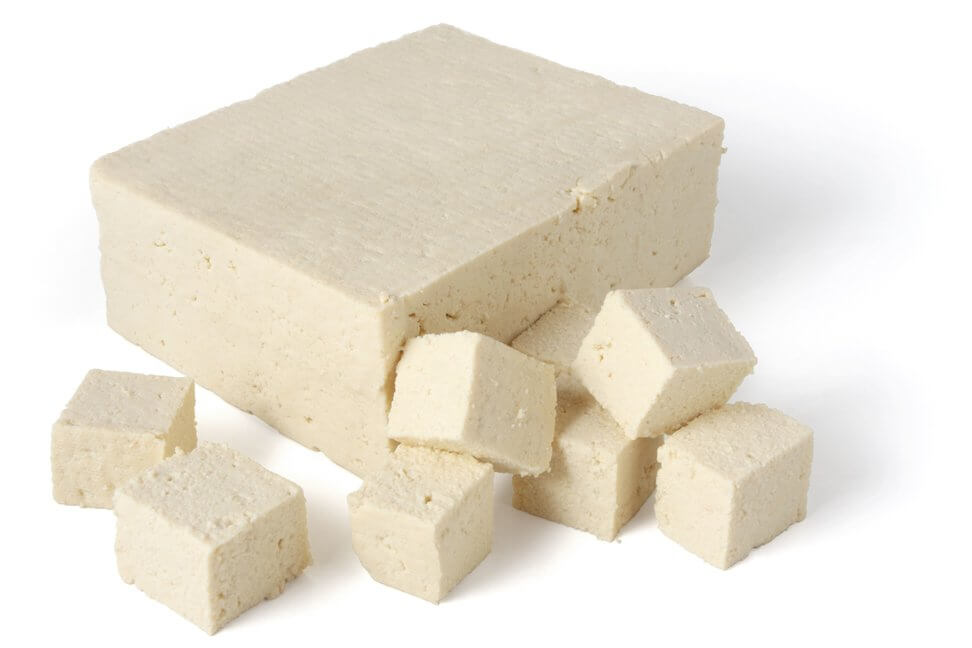Tofu is a great food to help get enough protein as a vegan (or as a non-vegan as well). But as we’ve all heard, there are some scary claims about it.
Ask most guys about eating tofu, and they’ll either say, “doesn’t tofu have estrogen” or “won’t that raise your estrogen levels?”
Most people who say that have never read a study on the topic.
My goal with this post is to go over relevant research to see if tofu actually raises estrogen levels. And if so, by how much?
First we’ll look at research on soy intake and hormone levels in women, and then in men.
Table of Contents
Does Soy Contain Estrogen?: Estrogens vs Phytoestrogens

Estrogen is a class of hormones that the body can synthesize.
They can enter cells and activate estrogen receptors to express certain genes, mainly related to sex.
The 3 main estrogens are (try to remember them, I mention them later on):
- Estrone
- Estradiol
- Estriol
Soy does not contain estrogens.
What certain plants, like soy, do contain are isoflavones, which act as phytoestrogens (essentially an imitation estrogen) in mammals.
While they’re not the exact same as those main 3 estrogens, they can activate the same estrogen receptors and have an impact on our endocrine systems.
The question is, what impact can and do they have?
Most Soy and Estrogen Studies Are Done on Women
I assume many guys are like me, and totally oblivious that the main interest around soy raising estrogen levels isn’t about growing breasts, but actually cancer prevention and estrogen therapy.
Most studies around this topic have been done with women so far.
For example, studies suggest that genistein (the main isoflavone in soy) can increase estrogen synthesis in certain situations (like perimenopause in women).
Other studies show that soy may have cancer-preventive effects, particularly in the case of breast cancer.
However, the mechanism isn’t quite clear. Those same studies show that soy consumption results in estrogen decrease (particularly estradiol) if anything in premenopausal women.
Current research shows that soy typically doesn’t affect estrogen levels in women, unless they aren’t producing enough naturally, in which case producing more is a good thing.
Studies On If Soy Intake Raises Estrogen in Men
There aren’t quite as many studies done for men, but there are some.
We’ll look at the results of a few specific ones looking at estrogen and testosterone levels, but be aware that there are other studies like this one that show soy consumption is correlated to a decreased risk of prostate cancer.
Here’s a summary chart of the main details behind 3 studies of soy consumption in men.
Note the “isoflavone intake” column, which is the daily amount of isoflavones (i.e. phytoestrogens) the test group ate from soy. For reference, there’s about 25mg of isoflavones in 100g of tofu (about a third of a block) or in 250mL of soymilk.
| Study | Sample size | Diet | Isoflavone intake (mg/d) | Study length |
|---|---|---|---|---|
| Habito et al. | 42 | Tofu | 70 | 1 month |
| Nagato et al. | 34 | Soymilk | 48 | 2 months |
| Mitchell et al. | 14 | Soy extract | 40 | 2 months |
There’s a few things to note here before looking at the results.
First, the sample sizes aren’t very big. You can’t draw sweeping conclusions about anything no matter the result, especially since research suggests that soy impacts hormone levels differently based on gender and race.
Second, the study lengths were fairly short. The results of high amounts of soy on a long-term basis could be different.
With that said, here were the main takeaways:
- Habito et al. – No difference in blood concentrations of estradiol (a major estrogen) or testosterone. An 8.8% increase of SHBG (Sex hormone-binding globulin), which generally correlates with high estrogen or thyroxine levels.
- Nagato et al. – Slight reduction of estrone concentrations in blood in soy-supplemented group. No change in total or free testosterone, SHBG, or estradiol.
- Mitchell et al. – No effect on semen quality (volume, concentration, or motility).
Finally, I came across a 2010 meta-analysis of 15 controlled studies that found:
No significant effects of soy protein or isoflavone intake on T, SHBG, free T, or FAI were detected regardless of statistical model.
Current research clearly shows that soy does not affect estrogen levels or testosterone levels in males.
Summary: Does Soy Raise Estrogen Levels
Overall, the studies we looked at suggest that even a block of tofu a day on a regular basis doesn’t seem to have any real significant effects on estrogen or testosterone levels.
Still, the results aren’t particularly definitive. They mostly look at a small specific group of people over a short term.
Much more needs to be done to determine the complete effect of soy (and its isoflavones) on the human body, but it seems fairly minimal either way for now.
One final note is that studies also appear to show at this point that vegans and omnivores have about the same overall levels of testosterone (not looking at just soy intake).
